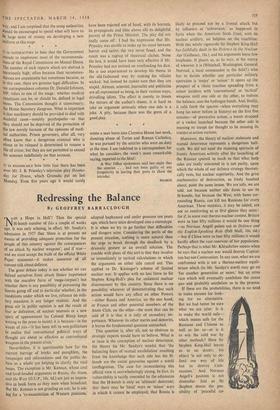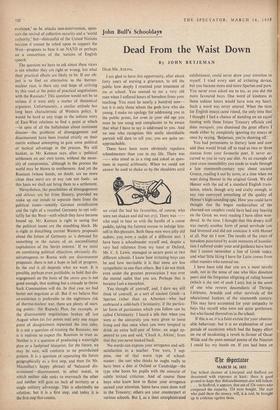Redressing the Balance
By GEOFFREY BARRACLOUGH Nor a Hope in Hell'! Thus the special H-bomb number of Isis a couple of weeks ago. It was only echoing, in effect, Mr. Sandys's admission in 1957 that 'there is at present no means' of providing adequate protection for the People of this country against the consequences of an attack by nuclear weapons'; and if true— and we must accept the truth of the official White Paper statement—it makes nonsense of all current talk about defence.
The great debate today is not whether we can defend ourselves from attack (hence impatience with the macabre farce of 'mega-corpses') but whether there is any possibility of preventing the bombs going off and in particular whether, in the conditions under which we live, reliance on mili- tary measures is any longer realistic. And the great stir in public opinion is not the result of fear or defeatism, of nuclear neurosis or a new spirit of appeasement (as Colonel Blimp keeps writing to the press to insist); it is because—in the Words of /sis—'it has been left to non-politicians to realise that conventional political ways of thought are about as effective as conventional weapons in the present crisis.'
Nevertheless, it is questionable how far the current barrage of books and pamphlets, the campaigns and referendums and the public de- bate as a whole are helping to clarify the vital issues. The exception is Mr. Kennan, whose cool and level-headed arguments in Russia, the Atom, and the West (0.U.P., 10s. 6d.) are just as impres- sive in book form as they were when broadcast. But Mr. Kennan is not grinding an axe; he is ask- ing for a 're-examination of Western positions,' adopted haphazard and under pressure ten years ago, which have since developed into a stereotype. It is when we try to go further that difficulties and dangers arise. Considering the perils of the present situation, nothing is more natural than the urge to break through the deadlock by a dramatic gesture or an overall solution. The trouble with plans of this sort is that they involve us immediately in tactical calculations in which the arguments on either side cancel out. This applied to Dr. Kissinger's scheme of limited nuclear war. It applies with no less force to Sir Stephen King-Hall's plea for unilateral nuclear disarmament by this country. Since there is no possibility whatever of demonstrating that such action would have any effect on other Powers —either Russia and America, on the one hand, or France and other potential members of the Atom Club, on the other—the most that can be said of it is that it is only of secondary im- portance. Whatever its other merits and demerits, it leaves the fundamental question untouched.
This question is, after all, not so abstruse as strategic experts would have us believe. What is at issue is the conception of nuclear deterrence, the theory (in Mr. Sandys's words) that 'the balancing fears of mutual annihilation' resulting from the knoWledge that each side has the H- bomb are the surest guarantee against a world conflagration. The case for reconsidering this official view is overwhelmingly strong. In fact, its vulnerability is tacitly conceded by the admission that the H-bomb is only an 'ultimate' deterrent; that there may be 'local' wars or 'minor' wars in which it cannot be employed; that Russia is likely to proceed not by a frontal attack but by influence or 'subversion,' as happened in Syria when the American Sixth. Fleet, with its nuclear artillery, sat helpless on the touchline. With this whole rigmarole Sir Stephen King-Hall has faithfully dealt in his Defence in the Nuclear Age (Gollancz, 18s.), and his arguments leave few loopholes. It places us, as he says, at the mercy of whoever it is (Whitehall, Washington, General Norstad, a local commander in the field?) who has to decide whether any particular military operation is 'major' or 'minor.' It opens up the prospect of a chain reaction spreading from a minor incident with 'conventional' or 'tactical' weapons until one side or the other, to redress the balance, uses the hydrogen bomb. And, finally, it calls forth the spectre—when everything may hang (as never before in history) on the first five minutes—of preventive action, a bomb dropped or a rocket launched because the other side is massing its troops (or thought to be massing its troops) at action stations.
Moreover, the theory of nuclear stalemate and mutual deterrence represents a dangerous half- truth. We did not need the stunning spectacle of frantic American activity after the launching of the Russian sputnik to teach us that what both sides are really interested in is not parity, upon which the whole of our defence strategy theoreti- cally rests, but nuclear superiority. And the grim mathematics of destruction, so freely bandied about, point the same lesson. We are-safe, we are told, not because neither side dares to use its about, point the same lesson. We are-safe, we are told, not because neither side dares to use its H-bombs, but because the West, with bases sur- rounding Russia, can kill ten Russians for every American. These statistics, it may be added, are not so comforting as at first glance they seem : for if, in some vast thermo-nuclear contest, Britain were to lose fifty millions it would be one thing —as Norman Angell points out in Defence and the English-Speaking Role (Pall Mall, 10s. 6d.) —but if China were to lose fifty millions it would hardly affect the vast reservoir of her population.
Perhaps that is what Mr. Khrushchev means when he says that a nuclear war would destroy Capital- ism but not Communism. In any case, what we are confronted with is not a thermo-nuclear equili- brium which (in Mr. Sandys's word) may go on 'for another generation or more,' but an arms race which will eventually annihilate the status quo and probably annihilate us in the 'process. If these are the probabilities, there is no need to make excuses for look- ing for an alternative.
But we had better be sure what we are after. Is it to make the world safe— which means safe for the Russians and Chinese as well as for us—or is it to win the cold war by other methods? Here Sir Steph'en King-Hall leaves us in no doubt : his object 'is not only to de- fend our way of life but to destroy Com- munism.' And Norman Angell's position is not dissimilar. Just as Sir Stephen denies the pos- sibility of 'peaceful co- existence,' so he attacks non-intervention, spon- sors the revival of collective security and a 'world authority,' but—distrustful of the United Nations because it cannot be relied upon to support the West—proposes to base it on NATO or perhaps on a consortium of the 'nations of English speech.'
The question we have to ask about these views is not whether they are right or wrong, but what their practical effects are likely to be. if our ob- ject is to find an alternative to the thermo- nuclear race, is there any real hope of arriving by this road at the point of practical negotiations with the Russians? This question would not be so serious if it were only a matter of theoretical argument. Unfortunately, a similar attitude has long been characteristic of Western policy. It would be hard at any stage in the tedious story of East-West relations to find a point at which —in spite of all the hullabaloo about imminent disaster—the problems of disengagement and disarmament have been treated strictly on their merits without attempting to gain some political or tactical advantage in the process. We still hanker, as Mr. Kennan says, after a 'political settlement on our own terms, without the neces- sity of compromise,' although in the process the world May be blown to smithereens. And yet the Russians (whose hands, no doubt, are no more clean than ours) are at any rate not fools : on this basis we shall not bring them to a settlement.
Nevertheless, the possibilities of disengagement and detente are far from illusory, provided we make up our minds to separate them from the political issues—notably German reunification and the right of a reunited Germany to opt mili- tarily for the West—with which they have become bound up. Mr. Kennan' is right in seeing that the political issues are the stumbling block. He is right in, describing current Western proposals about the future of Germany as 'a demand for something in the nature of an unconditional capitulation of the Soviet interest.' If we insist on combining, political objectives obviously dis- advantageous to Russia with our disarmament proposals, there is not ,a hope in hell of progress. In the end it all depends what we want. It is possible, perhaps even justifiable, to hold that dis- engagement on the basis of the status quo is not good enough, that nothing but a crusade to throw back Communism will do. In that case we had better not negotiate at all. But if we believe that co-existence is preferable to the nightmare risk of thermo-nuclear war, there are .plenty of startr ing points : the Rapacki Plan, for example, or the disarmament negotiations broken off last August when (as Isis points out) only one major point of disagreement separated the two sides. It is not a question of trusting the Russians; mit- is it realistic to expect the Russians to trust us. Neither is it a question of producing a watertight plan or a foolproof blueprint; for the future, we may be sure, will conform to no preordained pattern. It is a question of separating the forces geographically as a first step, and then (in Mr. Macmillan's happy phrase) of 'balanced dis- armament'—disarmament, in other words, in which neither side seeks to overreach the other and neither will gain an inch of territory or a single military advantage. This is admittedly no solution; but it is a first step, and today it is the first step that counts.



































 Previous page
Previous page